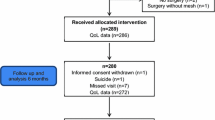Abstract
Introduction and hypothesis
Although colpocleisis is effective in selected women, the low-morbidity obliterative procedure for treating pelvic organ prolapse (POP) and its impact on postoperative quality of life (QOL) have rarely been studied. Our aim was to assess QOL in women after colpocleisis and compare it with that of women after reconstructive vaginal surgery.
Methods
This retrospective cohort study included women (aged 35–85 years) with POP who underwent obliterative or reconstructive surgical correction during 2009–2015. Patients who met the inclusion criteria underwent telephone interviews that included the validated Prolapse QOL questionnaire (P-QOL Thai).
Results
Of 295 potential participants, 197 (67%) completed the questionnaire: 93 (47%) with obliterative and 104 (53%) with reconstructive surgery. Most were Thai (95.4%), multiparous (87%), and sexually inactive (76%). Their histories included hysterectomy (12%), incontinence or prolapse surgery (11%), and POP stage 3/4 (77%). Patients undergoing obliterative surgery were significantly older than those undergoing a reconstructive procedure (69 vs 58 years, P < 0.05). The obliterative group had more children, less education, and more advanced POP. There were no significant differences in operative parameters or complications. The obliterative surgery group had a significantly shorter hospital stay: median 2 (range 1–17) days vs 3 (1–20) days (P = 0.016). P-QOL scale revealed significantly less postoperative impairment in the obliterative surgery group (1.75 vs 5.26, P = 0.023). There were no significant differences in other P-QOL domains.
Conclusions
Colpocleisis improves condition-specific QOL in selected patients with advanced POP and remains an option for this group. Surgeons should consider counseling elderly women with advanced POP about obliterative vaginal surgery.
Similar content being viewed by others
References
Subak LL, Waetjen LE, van den Eeden S, Thom DH, Vittinghoff E, Brown JS. Cost of pelvic organ prolapse surgery in the United States. Obstet Gynecol. 2001;98(4):646–51.
Hendrix SL, Clark A, Nygaard I, Aragaki A, Barnabei V, McTiernan A. Pelvic organ prolapse in the Women’s Health Initiative: gravity and gravidity. Am J Obstet Gynecol. 2002;186(6):1160–6.
Chuenchompoonut V, Bunyavejchevin S, Wisawasukmongchol W, Taechakraichana N. Prevalence of genital prolapse in Thai menopausal women (using new standardization classification). J Med Assoc Thail. 2005;88(1):1–4.
Deffieux X, Thubert T, Donon L, Hermieu JF, Le Normand L, Trichot C. Colpocleisis: guidelines for clinical practice. Prog Urol. 2016;26(Suppl 1):S61–72. https://doi.org/10.1016/s1166-7087(16)30429-8.
Crisp CC, Book NM, Smith AL, Cunkelman JA, Mishan V, Treszezamsky AD, et al. Body image, regret, and satisfaction following colpocleisis. Am J Obstet Gynecol. 2013;209(5):473.e471–7. https://doi.org/10.1016/j.ajog.2013.05.019.
FitzGerald MP, Richter HE, Siddique S, Thompson P, Zyczynski H, Ann Weber for the Pelvic Floor Disorders Network. Colpocleisis: a review. Int Urogynecol J Pelvic Floor Dysfunct. 2006;17(3):261–71. https://doi.org/10.1007/s00192-005-1339-9.
Crisp CC, Book NM, Cunkelman JA, Tieu AL, Pauls RN, Network Society of Gynecologic Surgeonsʼ Fellowsʼ Pelvic Research Network. Body image, regret, and satisfaction 24 weeks after colpocleisis: a multicenter study. Female Pelvic Med Reconstr Surg. 2016;22(3):132–5. https://doi.org/10.1097/spv.0000000000000232.
Manchana T, Bunyavejchevin S. Validation of the prolapse quality of life (P-QOL) questionnaire in Thai version. Int Urogynecol J. 2010;21(8):985–93. https://doi.org/10.1007/s00192-010-1107-3.
FitzGerald MP, Brubaker L. Colpocleisis and urinary incontinence. Am J Obstet Gynecol. 2003;189(5):1241–4.
Zebede S, Smith AL, Plowright LN, Hegde A, Aguilar VC, Davila GW. Obliterative LeFort colpocleisis in a large group of elderly women. Obstet Gynecol. 2013;121(2 Pt 1):279–84. https://doi.org/10.1097/AOG.0b013e31827d8fdb.
Thubert T, Dache A, Leguilchet T, Benchikh A, Ravery V, Hermieu JF. Obliterative vaginal surgery for genital prolapse: a retrospective cases series. Prog Urol. 2012;22(17):1071–6. https://doi.org/10.1016/j.purol.2012.09.021.
Yeniel AO, Ergenoglu AM, Askar N, Itil IM, Meseri R. Quality of life scores improve in women undergoing colpocleisis: a pilot study. Eur J Obstet Gynecol Reprod Biol. 2012;163(2):230–3. https://doi.org/10.1016/j.ejogrb.2012.04.016.
Murphy M, Sternschuss G, Haff R, van Raalte H, Saltz S, Lucente V. Quality of life and surgical satisfaction after vaginal reconstructive vs obliterative surgery for the treatment of advanced pelvic organ prolapse. Am J Obstet Gynecol. 2008;198(5):573 e571–7. https://doi.org/10.1016/j.ajog.2007.12.036.
Barber MD, Amundsen CL, Paraiso MF, Weidner AC, Romero A, Walters MD. Quality of life after surgery for genital prolapse in elderly women: obliterative and reconstructive surgery. Int Urogynecol J Pelvic Floor Dysfunct. 2007;18(7):799–806. https://doi.org/10.1007/s00192-006-0240-5.
Hullfish KL, Bovbjerg VE, Steers WD. Colpocleisis for pelvic organ prolapse: patient goals, quality of life, and satisfaction. Obstet Gynecol. 2007;110(2 Pt 1):341–5. https://doi.org/10.1097/01.AOG.0000270156.71320.de.
Acknowledgements
We thank Nancy Schatken, BS, MT(ASCP), from Edanz Group (www.edanzediting.com/ac) for editing a draft of this manuscript.
Author information
Authors and Affiliations
Corresponding author
Ethics declarations
Conflicts of interest
None.
Electronic supplementary material
ESM 1
(DOCX 19 kb)
Rights and permissions
About this article
Cite this article
Petcharopas, A., Wongtra-ngan, S. & Chinthakanan, O. Quality of life following vaginal reconstructive versus obliterative surgery for treating advanced pelvic organ prolapse. Int Urogynecol J 29, 1141–1146 (2018). https://doi.org/10.1007/s00192-018-3559-9
Received:
Accepted:
Published:
Issue Date:
DOI: https://doi.org/10.1007/s00192-018-3559-9



